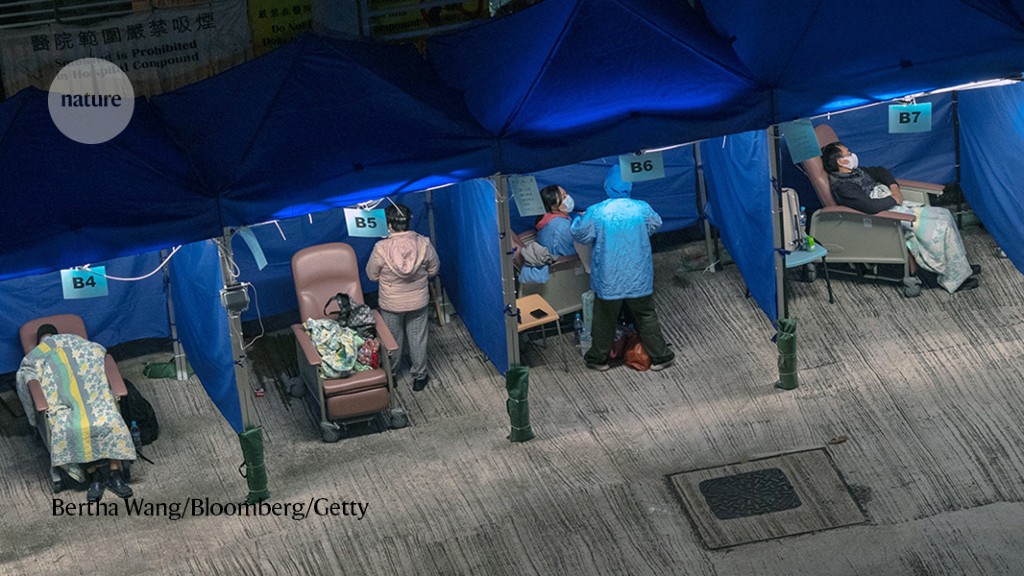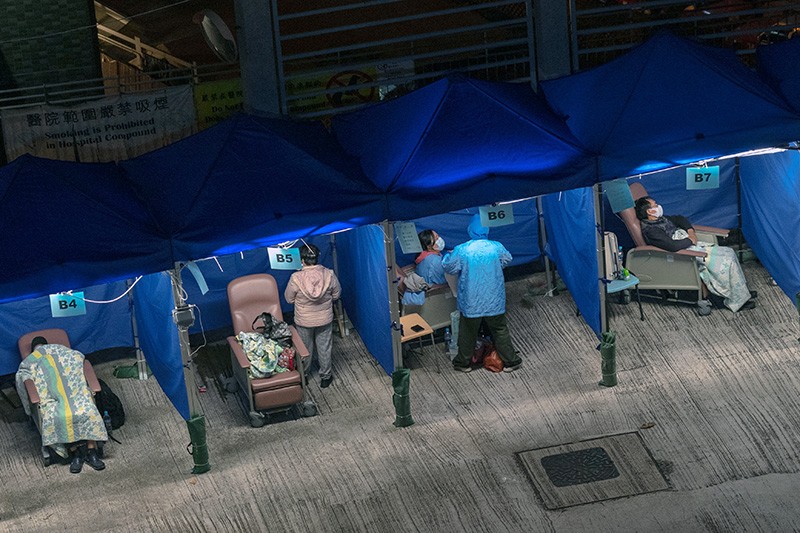The rapidly spreading BA.2 variant of SARS-CoV-2 could once again make doctors rethink antibody treatments for COVID-19.
Manufactured immune molecules called monoclonal antibodies are essential for keeping people with COVID-19 out of hospital. Now, early laboratory data1,2 hint that the key antibody sotrovimab could lose effectiveness against the rapidly spreading BA.2 variant. Sotrovimab is one of the few therapies for COVID-19 caused by the Omicron variant, which overpowers several antibody treatments that were effective against previous strains.
Just in time, US regulators have given emergency approval to another monoclonal antibody, bebtelovimab, that inhibits both the original Omicron strain3 and BA.21 in laboratory assays.
But for many researchers, the sotrovimab findings are a testament to the uphill battle of keeping up with SARS-CoV-2 as it evolves to evade immune systems, antibody treatments and vaccines.
“With monoclonal antibodies, we’re trying to hit a moving target,” says David Ho, a virologist at Columbia University in New York City and a co-author of one of the studies. “It’s a really difficult endeavour to chase after a virus.”
Most antibody treatments target and attach to SARS-CoV-2’s spike protein, which the virus uses to enter cells. But the protein is also a hotbed for mutations as the coronavirus evolves to evade the immune system.
Omicron, for example, has dozens of new mutations in its spike protein. These might explain why two monoclonal-antibody cocktails used to treat the highly virulent Delta variant proved powerless against Omicron4. That left sotrovimab as the only FDA-approved monoclonal-antibody treatment option for infected people at high risk of developing severe COVID-19.
The first known variant of Omicron, named BA.1, remains the most prevalent variety of the virus in many countries, including the United States and the United Kingdom. But cases of BA.2, which is related to BA.15, are rising in countries including Denmark, India and China.
Antibody escape
To see how common antibody treatments stood up to the newer varieties of SARS-CoV-2, Ho and his colleagues tested the treatments against a purpose-built virus that included the BA.2 spike. The results1, which have not been peer reviewed, revealed a steep drop in sotrovimab’s ability to neutralize BA.2.
Those findings were reinforced by another preprint2, in which a team at the New York University Grossman School of Medicine reported a similar reduction in sotrovimab’s neutralization strength against BA.2. But researchers caution that it is too early to say what these numbers mean for the front-line treatment of COVID-19.
“We cannot extrapolate laboratory findings to human treatment outcomes,” says Ho. “We’re just drawing attention to the fact that BA.2 is quite resistant to sotrovimab in the lab, and that raises questions about whether you can adequately cover BA.2 in patients.”
Ho notes that sotrovimab also showed reduced efficacy against BA.2 in a preprint6 posted 18 February by scientists at Vir Biotechnology, the company based in San Francisco, California, that produces the antibody. The study has not yet been peer reviewed. In a statement, Vir says the research suggests that sotrovimab “retains neutralizing activity” against BA.2.
A new antibody to the rescue?
Regardless of sotrovimab’s abilities, bebtelovimab could become a go-to antibody to prescribe for people infected with BA.2. Ho and his colleagues found that it is active against both BA.1 and BA.2.
The possibility of sotrovimab losing its edge against a new variant isn’t unexpected, says Miles Davenport, an immunologist at the University of New South Wales in Sydney, Australia. Like vaccines, he says, antibody treatments can become less effective when the virus evolves.
But he adds that even if sotrovimab doesn’t provide the same level of protection that it did against previous variants, it could still give some relief to people infected with BA.2. “Just because monoclonal antibodies bind less well to the variants, does not mean they will be useless,” he says.
Keeping ahead of the virus
Rajesh Gandhi, an infectious-disease physician at Massachusetts General Hospital in Boston, says that sotrovimab will probably continue to be used while BA.1 remains prevalent. In the meantime, he and other experts say that the questions about sotrovimab underline the need to develop and deploy treatments for COVID-19 that remain effective even when the virus mutates.
“If COVID has taught us anything, it’s that we need to prepare,” says Gandhi. “If BA.2 doesn’t become the most dominant variant, good. But if it does, it’s good to have some thoughts around it, so we can optimize treatments for our patients.”






More News
Daily briefing: Carrion crows have counting skills seen only in people
Researcher parents are paying a high price for conference travel — here’s how to fix it
Asymmetric hydrogenation of ketimines with minimally different alkyl groups – Nature